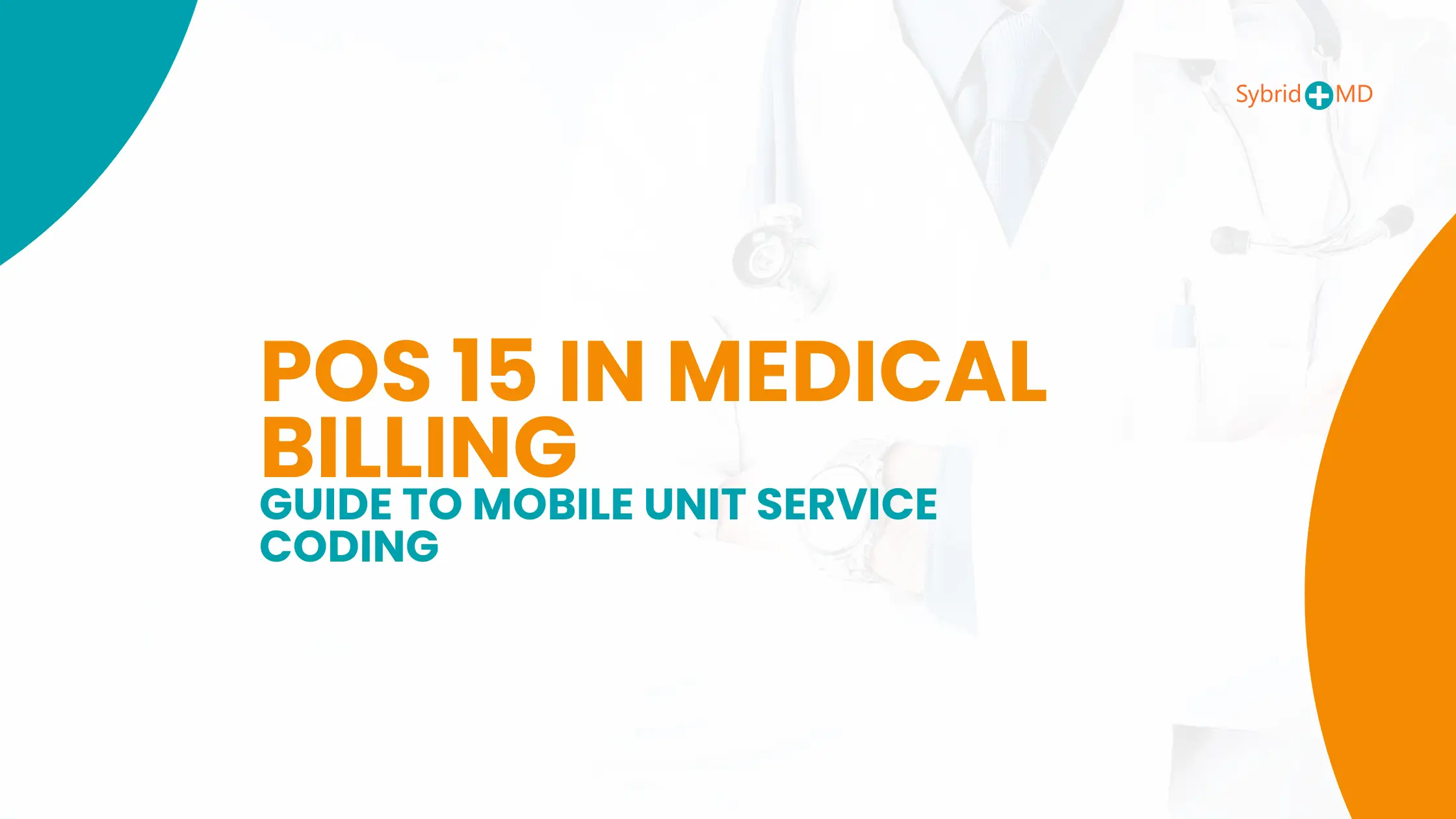POS codes represent a critical element within the process of medical coding since they identify the context of the healthcare services. These codes are maintained by the Centers for Medicare & Medicaid Services and are highly essential in medical billing and reimbursement processes of the insurance companies. POS 15 is to indicate a Mobile Unit, which means a medical facility that is on the move and can do, provide, or perform the functions of prevention, diagnosis, or treatment.
POS 15 in Medical Billing
CMS Official Definition of POS 15
POS 15 talks of a “Mobile Unit” within the CMS connotation. Namely, it is defined as: “A prepaid, fixed, non-fixed station for delivering preventive, screening, diagnostic, and/or treatment services.” The peculiarities here are in one term, ‘permanently non-fixed,’ which differentiates mobile units from clinics or hospitals. These units are not just physically shifted; they undergo construction to constantly be mobile and cater to different populations at different geographical locations. Visualize closed-circuit service vehicles such as buses, van, or trucks that have all the essentials that may be required in the delivery of medical facilities to patients right at their homes, their workplace, or school.
Breaking Down the Key Components
To have the ability to get a clear view of POS 15, it has become necessary to explore what constitutes the definition of a ‘Mobile Unit’ according to the rules formulated by CMS. First, we insist on the complete mobility of the facility, which means that it cannot be temporarily relocated to another location. This makes it specifically built for wheel use, built to be fully functional on wheels, and even operated in such an environment as a clinic.
Such include mobile mammography buses, dental vans, mobile lab testing and sample collection facilities, mobile vaccination units, and even small ambulance-like small-scale clinics. These vehicles are fitted with health-enhancing appliances, record-keeping systems, and at times are fitted with sanitation amenities and internet accessibility to support diagnoses and telemedicine consultations.
Second, some services must be treated as being given within the mobile unit itself. This is a critical detail. This helps to maintain order in coding, and it also plays the role of ensuring all the claims submitted meet the required regulatory compliance in line with the insurer and CMS. Similar to the previous seven units, the unit also needs to abide by safety and health standards to be considered credible for POS 15 billing. Mobile units are also required to be as clean and equipped as other ordinary clinics and other health centers.
When to Use POS 15?
Use POS 15 when:
- They are provided in a portable apparatus.
- It follows all the legal Information on the unit for medical care for the disabled.
- Staffed by certified professionals.
This code is popular among:
- Public health outreach programs
- Non-profit healthcare missions
- Rural health organizations
It does not matter if a doctor opens an office in a van and gives a flu vaccination in a neighborhood that is POS 15. Homes are affected in the same measure depending on when they will step into someone’s home it becomes POS 12.
Real-World Examples
- Fixed having another positive correlation with the number of mobile COVID-19 testing sites that are vehicle-based
- Dental vans situated near schools offering checkups to the students
- Buses carrying out vision screening in underinsured communities
Whenever attention is paid inside that mobile facility, POS 15 is the correct one.
POS 11 in Medical Billing
POS 11 in Medical Billing represents the Office, which indicates a fixed health care center where regular procedures are undertaken. This remains the typical doctor’s office, clinic, medical group/center, or hospital location.
POS 11 is used for:
- Scheduled doctor appointments
- Chronic disease management
- Routine checkups
In-office minor procedures
This is the most used POS in the outpatient facilities across the world.
POS 11 vs POS 15
| Feature | POS 11 (Office) | POS 15 (Mobile Unit) |
| Location Type | Fixed facility | Mobile, on wheels |
| Services | Broad outpatient | Outreach & screening |
| Equipment | Permanent setup | Installed in the vehicle |
Don’t mix them up. This is because billing for mobile services under point of service 11 can attract complaints of noncompliance and consequent denial.
POS 12 in Medical Billing
What Is Considered Home in POS 12?
POS 12 in Medical Billing defines services given at the patient’s home. This could be:
- A house
- An apartment
- Independent living (not licensed as one)
Common services include:
- In-home nursing visits
- Physical therapy sessions
- Chronic illness management
POS 12 is beneficial for home health agencies and physicians who perform house calls.
Key Differences from POS 15
| Criteria | POS 12 (Home) | POS 15 (Mobile Unit) |
| Service location | Inside the patient’s home | Inside the medical vehicle |
| Common users | Home health nurses | Public health outreach |
| Typical services | Chronic care | Screenings, vaccines |
If care is provided in the van parked outside the home, that’s POS 15—not POS 12.
POS 20 in Medical Billing
POS 20 in medical billing is used when care is delivered at an urgent care facility, that is, an entity that:
- Provides walk-in services
- Is not emergency department-level care
- Treats minor illnesses or injuries
It’s used for:
- After-hours clinics
- Immediate care for sore throats, minor wounds, and flu symptoms
Urgent care centers need to meet operational factors such as staffing requirements, the number of hours it is open, and services offered to be considered under POS 20.
POS 20 vs POS 15 Explained
While both may seem similar in their flexibility and walk-in nature, they are quite different.
| Comparison | POS 20 (Urgent Care) | POS 15 (Mobile Unit) |
| Location | Fixed, walk-in clinic | Mobile, travels |
| Patient Type | Unscheduled visits | Scheduled or outreach |
| Facility Type | Urgent care centers | Vans, buses, mobile units |
POS 20 is not to be used for care provided from a van, even if the urgency level is the same.
POS 21 in Medical Billing
POS 21 is defined as services that relate to patients who are formally admitted to a hospital. It involves:
- Round-the-clock medical care
- Overnight stays
- Complex treatment plans
POS 21 is typically used by:
- Surgeons
- Specialists
- Hospitalists
Examples:
- Appendectomy
- Cardiac monitoring
- Chemotherapy during a hospital stay
POS 21 vs POS 15
| Factor | POS 21 (Inpatient Hospital) | POS 15 (Mobile Unit) |
| Admission Required? | Yes | No |
| Facility Type | Full hospital | Traveling medical van |
| Patient Stay | Overnight or longer | Same-day outpatient |
Never confuse mobile health services with hospital admissions—they differ entirely in clinical scope and billing.
Conclusion
It is crucial to develop a thorough understanding of the Service Place codes particularly POS 15, POS11, POS 12, POS 20 and POS 21 to ensure clean Medical billings. Each code describes how and where care was given and the wrong one might lead to denial of claims, delayed payments and sometimes even compliance problems.
POS 15 is probably valuable when it comes to growth of mobile health which is current topical. You are either operating on the go or in a clinic, get the codes on the system and all other aspects of billing should fall into place.
Frequently Asked Questions
Can POS 15 be used for telehealth?
No, POS 15 is specifically a mobile, on-site application only. Notably, telehealth has its code either as POS 02 or POS 10.
Is POS 15 common in rural areas?
Yes, it is used greatly for example in the outreach camps where people in the rural areas cannot easily access health facilities.
Does POS 15 affect insurance coverage?
It might. Mobile sites and some payers may require prior authorization, and/or they may limit the participating networks.
How do I confirm whether the code I am using is the correct POS code?
Make sure that payers’ guidelines correspond with the CMS POS Code Set and documentation location.
Can one mobile unit use multiple POS codes?
Only if the location changes. For instance, if, the service is delivered from a mobile unit and part of the service delivery focuses on going into a home (which may be a customer selling soft drinks to a consumer in his house in a car not from the vehicle) then it may come under POS 12 but not POS 15.

